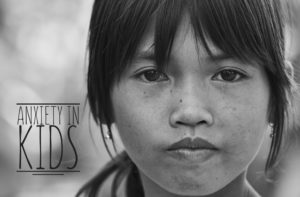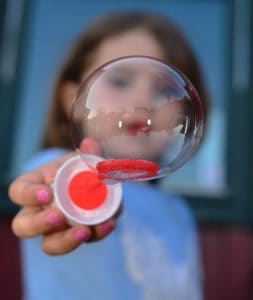Summer holidays usually conjure up images of sunshine, sweet watermelon, and happy kids playing along the beach. But let’s face it, for many kids with a trauma background, summer holidays can also be stressful! Normal routines have been bypassed by longer, leisurely days filled with a degree of flexibility and unpredictability on many fronts. Though enjoyable, this can be particularly challenging for kiddos with a history of trauma. As a result, challenging behaviors, increased levels of anxiety, difficulty sleeping, fits and emotional outbursts often seem to resurface.
Trauma does not take a summer vacation.
As a caregiver, summers can be wrought with frustration and difficulty. So in order to help provide you with some summer reprieve and keep your summer calm on, I’ve compiled some thoughts and ideas to help your child.
Routine
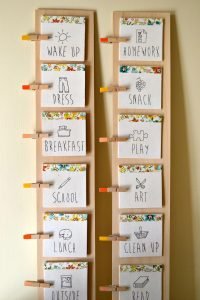 Often summer holidays invite a lack of routine and for kids with a history of trauma, this can be especially disruptive. Often, these children function better with structure and predictability as this enhances their feeling of being safe. Being safe is a critical message that kids with trauma play multiple times over in their brains – scanning and analyzing (often subconsciously) their environment. So, creating a safe feeling for them to thrive is necessary (tips: giving advance notice of schedules and/or changes for the day, utilizing a family calendar, enhancing morning or daily routines that are visible etc.) It not only perpetuates a calmer person but it does wonders for their nervous systems. Anxiety has a tendency to heighten the amygdala’s response to stress and as a result, the brain releases cortisol – the stress hormone. When life becomes unpredictable, kids with trauma tend to go into high alert mode – and with an increased release of cortisol – this signals stress and danger. Keeping this at bay can happen with a predictable and structured schedule and is also critical to decreasing anxiety which will help enhance a more peaceful abode.
Often summer holidays invite a lack of routine and for kids with a history of trauma, this can be especially disruptive. Often, these children function better with structure and predictability as this enhances their feeling of being safe. Being safe is a critical message that kids with trauma play multiple times over in their brains – scanning and analyzing (often subconsciously) their environment. So, creating a safe feeling for them to thrive is necessary (tips: giving advance notice of schedules and/or changes for the day, utilizing a family calendar, enhancing morning or daily routines that are visible etc.) It not only perpetuates a calmer person but it does wonders for their nervous systems. Anxiety has a tendency to heighten the amygdala’s response to stress and as a result, the brain releases cortisol – the stress hormone. When life becomes unpredictable, kids with trauma tend to go into high alert mode – and with an increased release of cortisol – this signals stress and danger. Keeping this at bay can happen with a predictable and structured schedule and is also critical to decreasing anxiety which will help enhance a more peaceful abode.
View link below for free printable ideas on morning routines. https://playfulnotes.com/morning-routine-for-kids-printable/embed/#?secret=04RAa9DLdv
Enhance Learning
 It is known that children with trauma histories usually experience some delays in learning. Learning loss is a thing most children experience over the summer and is a long contested issue among teachers. In order to build on all the wonderful input over the school year, summers can be a great way to enhance retention, knowledge, and help maintain the momentum they have garnered over the school year. This is important as solidifying concepts can take longer for kids with a trauma history and engaging in one on one or small group activities can help them be ready to start a new school year in the Fall rather than lagging behind. Activities can be engaging, fun, low-key but with an intentionality to them. IXL has some great math games available for a very low cost, Trading Cards builds on themes and writing skills with characters (no cost), Explore/Read/Learn at Start with a Book hosts many cool and exciting projects that are theme based as you navigate around (no cost). Some links below to guide you:
It is known that children with trauma histories usually experience some delays in learning. Learning loss is a thing most children experience over the summer and is a long contested issue among teachers. In order to build on all the wonderful input over the school year, summers can be a great way to enhance retention, knowledge, and help maintain the momentum they have garnered over the school year. This is important as solidifying concepts can take longer for kids with a trauma history and engaging in one on one or small group activities can help them be ready to start a new school year in the Fall rather than lagging behind. Activities can be engaging, fun, low-key but with an intentionality to them. IXL has some great math games available for a very low cost, Trading Cards builds on themes and writing skills with characters (no cost), Explore/Read/Learn at Start with a Book hosts many cool and exciting projects that are theme based as you navigate around (no cost). Some links below to guide you:
Anxiety & Mindfulness
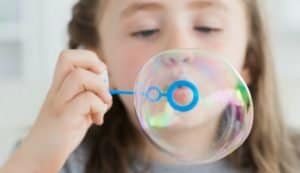 Understanding your child’s anxiety, their trigger points and what accentuates this is critical to disarming the ‘anxiety bug’. Learning to implement strategies to help them regulate big emotions is very helpful. Techniques such as breathing (deep breathing), attending yoga classes to learn and incorporate mindfulness, developing emotional literacy can all help (see this blog for more specifics on anxiety: https://www.complextrauma.ca/anxiety-complex-trauma/)
Understanding your child’s anxiety, their trigger points and what accentuates this is critical to disarming the ‘anxiety bug’. Learning to implement strategies to help them regulate big emotions is very helpful. Techniques such as breathing (deep breathing), attending yoga classes to learn and incorporate mindfulness, developing emotional literacy can all help (see this blog for more specifics on anxiety: https://www.complextrauma.ca/anxiety-complex-trauma/)
Exercise
 Research has shown that regular exercise can decrease anxiety, sleep disturbance, and other symptoms of traumatic stress – all the while improving a child’s quality of life (Babson et al, 2015; Goldstein et al, 2018; Rosenbaum et al, 1985; Ward & Stubbs, 2017). As trauma has a way of keeping score in the body, moving large muscles helps with endorphin release (increasing the happy vibe) – so things like the trampoline, nature walks, bicycling, hiking etc. are all key ingredients to freshening the mind and the body.
Research has shown that regular exercise can decrease anxiety, sleep disturbance, and other symptoms of traumatic stress – all the while improving a child’s quality of life (Babson et al, 2015; Goldstein et al, 2018; Rosenbaum et al, 1985; Ward & Stubbs, 2017). As trauma has a way of keeping score in the body, moving large muscles helps with endorphin release (increasing the happy vibe) – so things like the trampoline, nature walks, bicycling, hiking etc. are all key ingredients to freshening the mind and the body.
Visit a therapeutic-guided farm
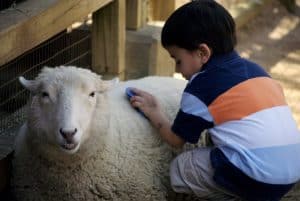 Most cities have them and these are wonderful at assisting kids with attachment, self-regulation, affiliation, and attunement. So many children feel akin to being close with animals and they provide a safe feeling of comfort (as well as makes for a great family outing in nature).
Most cities have them and these are wonderful at assisting kids with attachment, self-regulation, affiliation, and attunement. So many children feel akin to being close with animals and they provide a safe feeling of comfort (as well as makes for a great family outing in nature).
Reading
 Reading is a great way to bond with your child and keep their brains active and learning – it’s a quieter activity but can build on connection with care givers so this one is a win-win. So get on those shoes and explore your city libraries for story hour or keep it simple and snuggle up on the couch and read out loud or create a structured reading routine at bedtime or in the middle of the day.
Reading is a great way to bond with your child and keep their brains active and learning – it’s a quieter activity but can build on connection with care givers so this one is a win-win. So get on those shoes and explore your city libraries for story hour or keep it simple and snuggle up on the couch and read out loud or create a structured reading routine at bedtime or in the middle of the day.
Activities to keep kids reading all summer:
Build on their interests
This summer infuse in fun but low key activities. Examples could be hitting up the dollar store to fuse a sensory activity like making sand balloons otherwise known as stress balls for the crafty child or buying a couple of beach balls and throwing them around in your yard together for the sporty kid. It doesn’t need to cost a lot but can pique interest, create fun, and build memories together. Here’s some additional fun links:
Sensory activities for children
101 things to do with kids over the summer (keep boredom at bay)
Nutrition
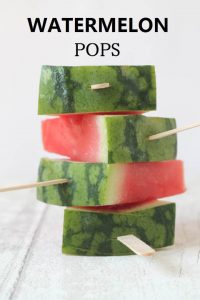 Sugar, even though it tastes good, can wreak havoc with kids – high high’s and low low’s which aren’t so fun for caregivers to manage. Summers should be filled with special treats and low key eating without all the stress and strain. Nutritious and balanced snacks shouldn’t be time consuming to make and can be free of all of those added preservatives. This makes a huge difference in managing challenging behavior. Here’s a link to easy and nutritious snacks for your summer kiddos: https://www.myfussyeater.com/25-best-healthy-summer-snack-kids/
Sugar, even though it tastes good, can wreak havoc with kids – high high’s and low low’s which aren’t so fun for caregivers to manage. Summers should be filled with special treats and low key eating without all the stress and strain. Nutritious and balanced snacks shouldn’t be time consuming to make and can be free of all of those added preservatives. This makes a huge difference in managing challenging behavior. Here’s a link to easy and nutritious snacks for your summer kiddos: https://www.myfussyeater.com/25-best-healthy-summer-snack-kids/
Sleep
 The body heals and resets through sleep so ensuring your child is getting enough regular and structured sleep is critical to enhancing those peaceful days. Let’s face it – none of us do well without adequate sleep and kids with trauma histories, need consistent and regular sleep to help reset the brain and ward off those ‘crabby blues’. An upside to structured bedtime routines over the summer means structured down-time for caregivers. (Note: black out drapes, weighted blankets, low whirring fans can all enhance sleep in the summer.)
The body heals and resets through sleep so ensuring your child is getting enough regular and structured sleep is critical to enhancing those peaceful days. Let’s face it – none of us do well without adequate sleep and kids with trauma histories, need consistent and regular sleep to help reset the brain and ward off those ‘crabby blues’. An upside to structured bedtime routines over the summer means structured down-time for caregivers. (Note: black out drapes, weighted blankets, low whirring fans can all enhance sleep in the summer.)
Wishing you all the best as you learn, grow, connect, and enjoy this time of togetherness over the summer with your children.
Extra Links:
- Various Deep Breathing Exercises that are easy to use with kids: https://copingskillsforkids.com/deep-breathing-exercises-for-kids
- Summer filled ideas about learning and engagement: https://www.readingrockets.org/article/get-ready-summer-ideas-teachers-share-families
Please Note: Nicole works part-time as a Complex Care and Intervention coach for Complex Trauma Resources and these have been re-printed by permission from Complex Trauma Resources Ltd. ©



